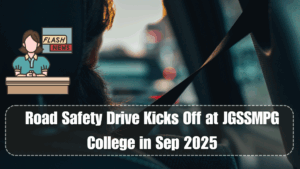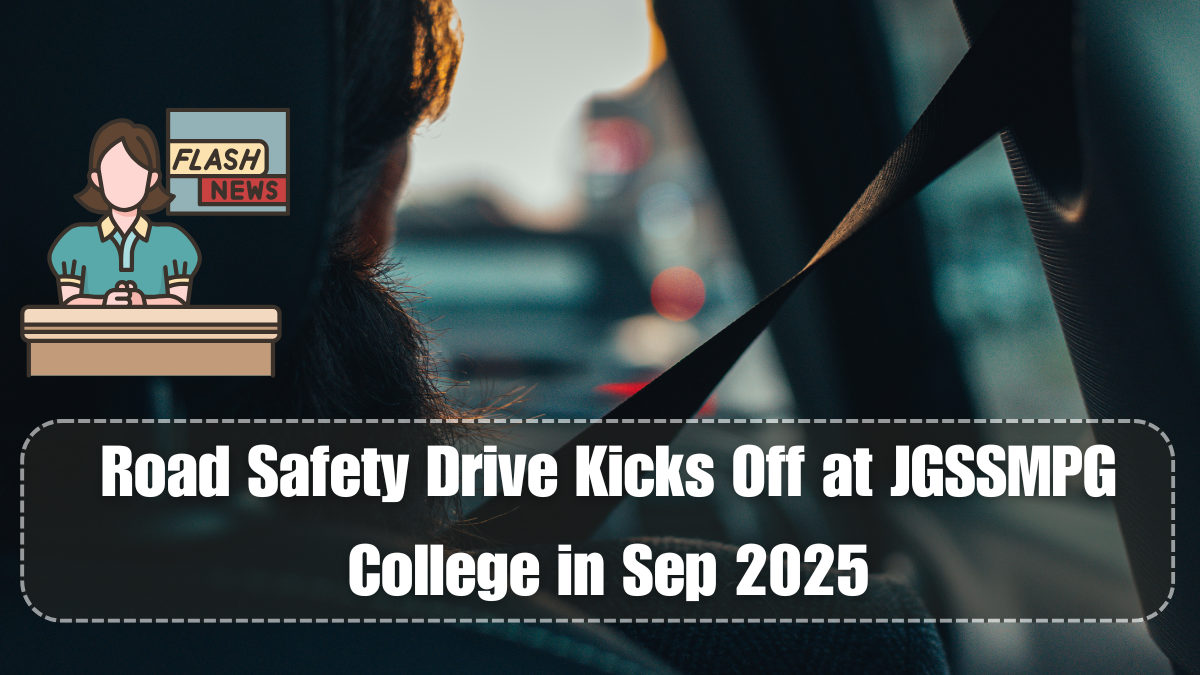With road accidents remaining a major cause of concern among India’s youth, institutions are stepping up to lead change. As part of its student welfare and social responsibility program, JGSSMPG College has launched a robust road safety youth campaign India this September. The month-long initiative aims to educate and empower undergraduate students with vital knowledge on traffic rules, defensive driving, and safe pedestrian behavior.
This campaign is not just a formal activity. It is a youth-led, action-oriented awareness drive designed to reach more than 2,000 students across disciplines. The goal is to make road safety a habitual practice—not just exam preparation content or legal compliance. India sees thousands of road injuries among young people annually, often due to ignorance, speeding, or lack of helmet and seatbelt use. Through this college-level initiative, JGSSMPG is setting an example for how educational institutions can fill this crucial gap in student awareness.
The road safety youth campaign India is being supported by local transport officers, police departments, NGOs, and student volunteers trained under certified modules. It represents the convergence of education, community leadership, and civic responsibility.

Key events under the road safety drive
The campaign, which kicked off on 1st September 2025, includes a variety of workshops, events, and simulation activities. These aren’t just classroom sessions—they’re designed to engage students practically and emotionally.
Highlights include:
-
Road Rules 101 Workshops: Interactive seminars where students are briefed on Indian road regulations, new traffic fines, and vehicle documentation rules.
-
Helmet and Seatbelt Demonstrations: Live demonstrations on correct helmet fitting, the importance of seatbelts in both front and rear seats, and impact test visuals.
-
Traffic Simulation Game Zones: Gamified learning environments where students attempt to navigate simulated traffic situations, with bonus points for obeying signals and pedestrian etiquette.
-
No Honking Zone Pledge: Students sign a public pledge to reduce unnecessary honking and adopt courteous road behavior.
-
Poster and Reel Contests: To promote creativity, students are encouraged to create short videos or digital posters promoting road safety.
These events make the college safety drive more inclusive and help personalize the campaign’s message. Faculty members are also participating, helping to foster a sense of collective responsibility.
Why this campaign matters now more than ever
According to recent transport ministry data, over 60% of India’s road fatalities involve people aged 18 to 35. For college students, poor awareness of traffic rules, overconfidence in driving, and lack of experience often contribute to risky road behavior. That’s why launching a road safety youth campaign India on campus is a timely and needed step.
Students today are also future professionals, policy influencers, and vehicle owners. Reaching them early helps instill habits that last a lifetime. JGSSMPG’s campaign focuses not just on passing the driving test but on living a safe and responsible commuter life. Additionally, since many students ride two-wheelers to campus, the emphasis on helmet discipline and road courtesy has been strategically built into the campaign.
This focus on safety goes hand-in-hand with national-level efforts, such as the MoRTH’s “Sadak Suraksha Jeevan Raksha” campaign. Colleges like JGSSMPG are becoming vital partners in this public movement.
College and police collaboration to ensure continuity
A notable feature of this drive is JGSSMPG’s collaboration with the Navi Mumbai Traffic Police and regional RTO officers. Police personnel are regularly visiting the campus to conduct live road-crossing sessions and legal awareness lectures.
Additionally, the campaign includes:
-
Fake License Identification Sessions
-
Understanding e-Challans and Traffic Surveillance
-
Guidelines on Using mParivahan and DigiLocker
By involving law enforcement directly in this transport awareness effort, students are not only learning but also building positive relationships with authorities—dispelling the myth that cops are only present to fine or scold.
The college has also announced that quarterly road safety workshops will become a permanent feature in the general education module for undergraduates.
Student feedback and response
The response from the student body has been overwhelmingly positive. Many have shared how this campaign has changed their perception of traffic rules and road behavior. Several B.Sc. and B.Com. students, who ride bikes to college, reported they now carry their driving license and wear helmets consistently.
Student leaders from the NSS unit and college unions are playing an active role in managing logistics, inviting speakers, and creating educational content for Instagram reels, YouTube Shorts, and newsletters. This ensures the road safety youth campaign India goes beyond temporary lectures and becomes a long-term habit-building movement.
Here’s what a few students had to say:
-
“I used to drive without my seatbelt thinking it didn’t matter in the back seat. Now I know better.” — Priyanka R, FYBA
-
“The simulation games were amazing. They made me realize how often I skip zebra crossings or speed up at yellow lights.” — Aman G, SYBCom
-
“I’m making a reel on helmet safety for our media department contest. Never thought road safety could be so creative.” — Sanya D, SYBSc
FAQs
Who organized the road safety youth campaign India at JGSSMPG?
The campaign was organized by the college administration with support from the traffic police, local RTO, NGOs, and student bodies.
Is participation in the campaign mandatory for all students?
While it is not mandatory, students are encouraged to attend sessions, participate in competitions, and take safety pledges.
Will this campaign continue beyond September?
Yes, JGSSMPG has announced plans to make road safety awareness a recurring initiative on campus with regular workshops and events.
What topics are covered in the campaign?
Road rules, helmet safety, pedestrian behavior, mobile usage while driving, e-Challan awareness, and fake license detection.
How is the campaign different from typical traffic lectures?
It uses games, live simulations, tech-based tools, and peer-created content to make learning fun, relatable, and engaging.
Conclusion
The road safety youth campaign India launched by JGSSMPG College in September 2025 sets a powerful example of how educational institutions can lead behavioral change. By making road safety a student-led, tech-powered, and creatively engaging initiative, the college is equipping its youth not just with traffic rules but with life-saving awareness. As the program continues to grow, it holds the promise of producing a new generation of safe, responsible, and socially aware road users.
Click here to know more.
